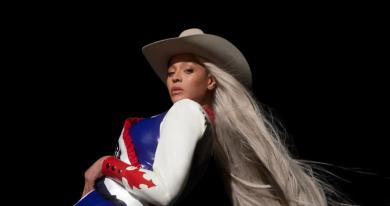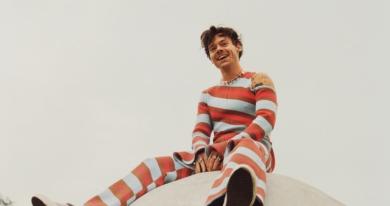2022 Music Year in Review: Taylor Swift's takeover, Beyoncé's big return and more historic moments
Take a look back on the past twelve months in music: the highs, the lows and those we lost

At the end of each year, it’s always interesting to reflect on the preceding twelve months and look at the unpredictable and occasionally bonkers things that have happened during another year in pop.
Did anyone have ‘nearly winning Eurovision’, ‘Beyoncé arriving on a DISCO HORSE to save music’ or ‘An old Kate Bush song going to Number 1’ on their pop predictions list?
Look, we may know our stuff at the Official Charts, but even we’re not that good.
So, join us as we flick through the memory banks and take a look at what happened in 2022.
Those we lost
Each year we bid a sad farewell to a host of stars, and 2022 was no different.
Meat Loaf, whose Bat Out Of Hell is one of the biggest-selling albums of all time left us in January; another massive-selling icon, Olivia Newton John, whose lengthy career had provided her with success in the movie Grease alongside a host of pop classics died in August; glorious Fleetwood Mac songbird and writer Christine McVie died after a short illness at the end of November and the seemingly fearless Foo Fighters drummer Taylor Hawkins who died in March were among the big music losses.
There was also Motown songwriter and producer Lamont Dozier; girl group icon Ronnie Spector; original rock n’ roller Jerry Lee Lewis; Country legend Loretta Lynn; Procol Harum’s Gary Brooker; matriarch of the ‘royal family of British folk music’ Norma Waterson; Hawkwind co-founder Nik Turner; jazz maverick Pharoah Sanders and pub blues rocker and occasional actor Wilko Johnson, and Stranglers drummer Jet Black.
Pop losses featured The Wanted’s Tom Parker, who died far too young in March; Chart-topping Pop Idol runner-up and actor Darius in August and Aaron Carter in November.

Also lost this year were a host of unique voices such as Fame and Flashdance (What A Feeling) lungsmith Irene Cara; dance diva and Come Into My Life hitmaker Joyce Sims; the haunting and ethereal Julee Cruise; one half of husband/wife duo Low, Mimi Parker, and the gravel-voiced Mark Lanegan whose distinct baritone led Screaming Trees as well as working with Queens of the Stone Age among numerous others.
Electronic music suffered heavy losses with titans such as Depeche Mode’s Andy Fletcher; synth-based film composer Vangelis; Tangerine Dream’s Klaus Schulze and trailblazing audio-visual artist Mira Calix all passing. In December, we also lost Faithless singer Maxi Jazz, aged 65, Terry Hall of The Specials, and Primal Scream's Martin Duffy.
Music entrepreneur and early champion of the likes of Ed Sheeran, Rita Ora and Stormzy, Jamal Edwards MBE left a big hole when he died suddenly in February, likewise gangsta rapper-turned-chef Coolio, and one third of rap supergroup Migos, Takeoff.
Synonymous with being the face of punk fashion, Pamela Rook aka Jordan died in April. There was also Aswad’s drummer and lead singer Angus ‘Drummie Zeb’ Gaye; post-punk PiL and Banshees guitarist Keith Levene, and Happy Mondays co-founder and bassist, and brother of Shaun, Paul Ryder.
There were also a series of one-offs whose impact on the charts and dancefloors over time may have been brief but brilliant, such as Why Can’t We Live Together hitmaker Timmy Thomas; R Dean Taylor of There’s A Ghost In My House fame; much-sampled jazz drummer Sandy Nelson; Pierre Kartner aka Smurf-herder Father Abraham; Convoy’s CW McCall, and actor, comedian and occasional chart star Bernard Cribbins.
The cheerios
Little Mix played their last shows as a group (for now...), and trust us that won’t be the last we’ll be hearing from Leigh-Anne, Jade and Perrie as each of them promptly headed off into the studio to launch solo careers.
Prog-pop legends Genesis played their last ever tour as a group too as they called it a day with their The Last Domino tour. The Pussycat Dolls finally decided to end it all after their brief reunion was blighted by Covid-based tour cancellations and then half the band learning of their demise via an Instagram post by Nicole. Messy.
ABBA
Having made the comeback of all comebacks at the end of 2021, excitement built towards the announced ABBA Voyage show, which the resurgent icons revealed would be held in their own custom-built arena in London’s Docklands. No one quite knew what to expect – would it be holograms, or some sort of trickery involving motion-capture technology?
Would fans have to don virtual reality-type goggles? - but snapped up tickets regardless ahead of its May opening. When the show finally opened, it was a combination all of that and far more besides.
A 'live' show featuring ABBA as their 1979 selves, running through all the classics from their catalogue accompanied by a real live band and a host of surprises. “It’s like they’re actually there!” seemed to be the common reaction, as fans went on a spectacular rollercoaster of emotions – elation, giddiness and there were a fair few tears shed too. In fact, at one point, ABBA were actually there, as fans were greeted by the heartwarming sight of all four members together in real life on its opening night.
The show itself was absolutely incredible, so much so that some punters have already been back several times to experience it again. Which is no doubt good news to ABBA as the cost of the venture is beyond eye-watering, with each element of the show costing over a million-per-minute to stage.

The OMG-THEY'RE-BACKS
While no one could quite beat last year’s return of ABBA after nearly 40 years, Altered Images gave it a good go with Mascara Streakz, their first album in 39 years. Also returning with their first new album as a duo in nearly 33 years were Tears For Fears.
Despite playing their ‘last ever gig’ in 2018, Soft Cell released Happiness Not Included as a belated follow-up to 2002’s Cruelty Without Beauty and hit the road again. After a period of ill health had made her inactive, Joni Mitchell made her live return after 20 years at the Newport Folk Festival.
xPropaganda, who were effectively the voices of Propaganda, and last troubled the charts in 1990, made an impactful return in May with The Heart Is Strange, as did Electribe 101 whose ‘lost’ album Electribal Soul appeared after a 30-year delay.
Those several-decade-waits seem to dwarf the lengthy absences of the likes of Yeah Yeah Yeahs, who released their first album in nine years, and Paolo Nutini, who scored his third consecutive Official Albums Chart Number 1 after going AWOL for eight years.
The six-odd year gaps between studio albums by Red Hot Chili Peppers, Jamie T, A-Ha and Beyoncé almost seem like nothing by comparison, and while it’s lovely that Rihanna’s seemingly now pulled her finger out and back in the pop game, we’re still tapping our watches hoping for a follow-up to 2016’s Anti at some point soon. Let us also not forget Britney Spears making a welcome return with her first Top 10 hit in nine years, teaming up with Elton John on Hold Me Closer.
Another comeback worth mentioning was the return of Glastonbury, which had been waylaid by Covid and postponed for two years. When it happened, it happened BIG, with punters desperate to get out to Worthy Farm again and generally have it large.
There was the uniqueness of having both the oldest (Paul McCartney) and youngest (Billie Eilish) Pyramid Stage headliners, with Sunday’s show-ender Kendrick Lamar settling for somewhere in between them age-wise, and there was a cavalcade of highlights such as Pet Shop Boys, Roisin Murphy, Olivia Rodrigo bringing out Lily Allen to run through F You, Diana Ross, Lorde, Wolf Alice, George Ezra and Sam Fender too.
Eurovision
Cheeriest-man-in-pop Sam Ryder pretty much reversed the UK’s fortunes at this year’s Eurovision, held in Turin, Italy after 2021’s triumph by Måneskin, coming a valiant second with SPACE MAN to Ukraine’s Kalush Orchestra.
SPACE MAN also became the UK’s highest-charting Eurovision song in 26 years claiming the runner-up position to a then-unshiftable As It Was in May. Although it was a bittersweet win of sorts for the UK in general, as due to the ongoing unpleasantness in Ukraine, the Eurovision board decided to grant the UK the opportunity to host the 2023 contest, and thus caused a massive surge in Airbnb rates in the Liverpool area when the city won the bid to stage the finals there.

Girl power
Newly crowned as the recipients of The BRITs Rising Star Award, and the first girl group to do so, Renée, Jorja and Stella aka FLO made an impact this year with their MNEK-produced viral hit Cardboard Box, and look set to move into the space left vacant by an on-hiatus Little Mix.
Spice Girls celebrated the 25th anniversary of Spiceworld with Melanie C quite keen to get another Spice Girls tour on the go. Girls Aloud celebrated 20 years since they won Popstars with the reissue of Sound Of The Underground, as well as honouring the last wish of their friend and bandmate Sarah Harding by hosting The Primrose Ball in aid of the Sarah Harding Breast Cancer research appeal project. After several years of umming and ahhing, the original Sugababes finally hit the road storming The Mighty Hoopla and a UK-wide tour while hinting at some new music (at last!) in the future.
There were also some sensational albums and career-best chart positions from Charli XCX – rewarded by Crash exploding at Number 1 in the Official Albums Chart – and Rina Sawayama channeling Shania Twain on the infectious This Hell. After a few years of major label grief, RAYE ended 2022 in style as an independent artist and a Top 3 smash with Escapism, and is finally releasing her debut album next year.
Guitars
The annual naysaying that ‘guitar music is dead’ was given short shrift this year, as the Official Albums Chart played host to no end of indie, metal and rock-adjacent turns, with Number 1 albums from Don Broco, 5SOS, The Wombats, Fontaines DC, Yungblud, Arctic Monkeys, Frank Turner, Kasabian, Bastille, Red Hot Chili Peppers, Stereophonics, The 1975, Liam Gallagher, Muse, Slipknot and Blossoms.
Strong impacts were made by Yard Act and Wet Leg with both their Mercury-nominated debut albums doing the business, as well as classy showings for Suede, Black Country New Road, Johnny Marr, Ghost, Sea Girls, Pale Waves, Feeder, Placebo, Jack White, Def Leppard, Foals, Megadeth and Ozzy Osbourne too.
The legends
Pop’s older guard were also out in force this year, with Paul McCartney and Diana Ross at Glastonbury (not together obviously, but we’d be here for THAT) and Elton John’s never-ending farewell tour passing through the UK before he closes Glastonbury next year. More used to success with anniversary editions of their catalogue, Pink Floyd released Hey Hey Rise Up, their first new song since 1994, which was based around a 1914 Ukrainian anthem and featured Andriy Khlyvnyuk of the Ukrainian band BoomBox. Roxy Music decided to celebrate their 50th anniversary in style with reissues of their imperial back catalogue and several dates across the globe.
UK Rap
From strength to strength was the key phrase to explain UK Rap’s ongoing chart takeover this year. There was Dave, who spent four weeks at pole position in the Official Singles Chart with Starlight back in March.
Stormzy issued notice of his return with the one-off song Mel Made Me Do It, and basically had EVERYONE in the accompanying video, before announcing the release of his third album This Is What I Mean, which became his third consecutive Official Albums Chart Number 1 in December.
Central Cee scored his first Number 1 album with the mixtape 23, and Aitch continued his domination with four Top 10 songs with a little help from Ashanti, Ed Sheeran and Anne-Marie. Ladbroke Grove’s own Digga D took drill to the top of the Official Albums Chart in April with his album Noughty By Nature, and there were huge chart showings for releases by Loyle Carner, M Huncho, Bru-C, Bad Boy Chiller Crew, and not forgetting Little Simz who not only bagged a BRIT and the Mercury Prize but ended 2022 with her brand new album No Thank You.
Awards
It was like the pandemic never happened as everything got back to normal this year, and once again the world of pop could happily mingle and swan up and down red carpets at awards dos.
It was ladies night at The BRITs, which had a shake-up of its awards set-up, focusing on genres and doing away with gendered categories. This year’s event was headed by the miraculous success of Adele walking home with statuettes for Best Artist, British Album for 30 and Song for Easy On Me. Holly Humberstone was anointed as the Rising Star, and also celebrated were Dua Lipa (Best Pop/R&B Act), Becky Hill (Dance Act), Little Simz (Breakthrough Artist), Olivia Rodrigo (International Song), Billie Eilish (International Artist) and the Ellie Rowsell-fronted Wolf Alice (British Group). Not to be outdone, Sam Fender (Alternative/Rock Act), Dave (Hip Hop/Rap/Grime) and a special Songwriter of the Year award for Ed Sheeran.
Little Simz also picked up this year’s Mercury Prize, triumphing above a strong nominee list of Yard Act, Harry Styles, Gwenno, Joy Crookes, Nova Twins, Wet Leg, Sam Fender and Self Esteem with her Sometimes I Might Be Introvert long-player.
Billie Eilish took home both the Academy Award and Golden Globe for Best Original Song for her Bond theme No Time To Die, and over in the Grammy Awards Bruno Mars and Silk Sonic were the big winners of the evening, as was Olivia Rodrigo who won Best New Artist, Pop Vocal Album (SOUR) and Pop Solo Performance (drivers license).
Harry Styles
What a year he’s had. Harry returned in April with his second solo Number 1 song As It Was, which spent a whopping ten weeks atop the chart, hanging around long enough for him to achieve the chart double when his third album Harry’s House opened with explosive figures in May, and becoming the only Official Albums Chart Number 1 to spend more than a fortnight at the top with an inconsecutive six week-reign.
Harry also was the first act since Justin Bieber to achieve the Top 3 songs simultaneously when Late Night Talking and Music For A Sushi Restaurant joined As It Was after Harry’s House was released.
Worldwide, Harry broke even more records when As It Was claimed the longest-running chart-topper by a UK act in the states, as well as the longest run at Number 1 in the US by a UK solo act in general, with a colossal 15 weeks beginning in April and eventually ending in October. There was also the unique distinction of becoming one of the rare acts to achieve both the Number 1 single on the Hot 100 and the Number 1 film at the US box office with Don't Worry Darling. It’s official: that man RULED the summer.
Beyoncé
The return of Beyoncé was a full-on cultural EVENT. Queen Bey’s seventh studio album RENAISSANCE came large and in capitals due to its importance. The internet had already broken slightly when she announced her comeback song BREAK MY SOUL, with its interpolation of Robin S’ Show Me Love indicating that Bey was ready to get down this time around, and writing on her Instagram that “I hope it inspires you to release the wiggle. Ha! And to feel as unique, strong, and sexy as you are." It did that, alright.
She then paid homage to fellow Pop Royalty with The Queens Remix, weaving Madonna’s iconic Vogue into a new mix of BMS. When RENAISSANCE arrived with atop a DISCO HORSE, it seemed primed for the dancefloor with features from disco legends Nile Rodgers, Grace Jones and a sample of the iconic Donna Summer and Giorgio Moroder track I Feel Love, and there were credits for producers and writers such as Skrillex, Labrinth, Nija Charles, The-Dream, Mike Dean, Christopher "Tricky" Stewart, 070 Shake, DIXSON, Hit-Boy and Drake. RENAISSANCE became her fourth Number 1 album and was a marvellous way to celebrate 20 years since her solo debut (yes, we count Work It Out) in 2002. All hail!

Record Breakers
No one was quite expecting Kate Bush to make a comeback this year, with pretty much doing nothing bar clearing a 37-year-old song for a soundtrack, but giving Stranger Things permission to use Running Up That Hill opened a whole new pop can of worms and broke a handful records at the same time.
After a sensational response to the 1985 song’s part in one of the key moments of the Netflix series, Running Up That Hill gained traction across the world’s charts as fans raced to stream the iconic hit, and introduced the wonderful world of pop auteur Kate Bush to a whole new generation. The eternally reclusive star remarked with a post on her website saying that "I’m overwhelmed by the scale of affection and support the song is receiving and it’s all happening really fast, as if it’s being driven along by a kind of elemental force. I have to admit I feel really moved by it all. Thank you so very much for making the song a No 1 in such an unexpected way.”
She became the oldest female artist ever to score a Number 1 on the Official Singles Chart. At 63 years and 11 months, she replaced Cher, who was 52 when Believe topped the Official Singles Chart in 1998. Kate now places fifth on the list of oldest artists to score a UK Number 1 single. Cher responded magnificently on Twitter with "Bravo Kate. Records Are Meant 2 Be Broken. Remember Back In The Day, When Women Had SHORT SELL BY DATES?!” Amazing.
Kate also smashed Wham!’s record of the longest time taken for a single to reach Number 1 on the Official Singles Chart, as Running Up That Hill first entered the chart in August 1985 and hit the top spot 37 years later. Kate also boasted the longest-ever gap between Number 1 singles in Official Chart history. With 44 years between her 1978 chart topper Wuthering Heights and 2022’s Running Up That Hill. No stranger (thing) to record breaking, Wuthering Heights had also made Kate not only the first female artist to have an entirely self-penned Number 1 hit in the UK, but also the youngest too.

Queen’s unstoppable 1981 compilation Greatest Hits not only passed the 1000-week milestone, it also became the first album to hit seven million ‘sales’ this year, reaching this record-breaking achievement through a combination of physical sales, downloads and streams. Reacting to the news, Queen’s Roger Taylor said, “The British public and their infinitely-great taste have made this the biggest-selling album in history. Thank you very much; we’re humbled and honoured. We salute you!”
Lewis Capaldi became the new king of streaming when his 2018 song Someone You Loved amassed a staggering 562 million streams (UK audio and video streams combined) to be crowned as the Most Streamed Song Of All Time, beating his pal Ed Sheeran. Lewis, in his inimitable way, was gracious (and hilarious) about it all, telling Official Charts that “Ed’s a man who is like a brother to me, he’s been a mentor, he’s put his arm round me and said don’t worry everything’s going to be ok. He gave us the honour of supporting him on the closing shows of the Divide tour, he’s been nothing but kind and gracious and beautiful, a good friend in an ever-changing industry. So to Ed I say ‘EAT MY SH*T! That’s what happens…nice guys finish last. You snooze you lose, kiddo. Keep up!'”
Robbie Williams not only celebrated 25 years since his debut album this year, he also broke the Official Charts record when his latest, XXV, took his total of solo chart-toppers to 14 Number 1 albums, beating Elvis Presley’s 13 - becoming the solo artist with the most Number 1 albums EVER in the UK - and placing him now only behind The Beatles who’ve had 15.
South Korean quartet BLACKPINK made some grand history this year too, becoming the first-ever K-pop girl group to achieve a Number 1 on the UK’s Official Albums Chart with their second album BORN PINK.

We Don’t Talk About Bruno from Disney’s Encanto became the first ever original Disney song to land the UK Official Chart Number 1, and held that position for seven weeks. This was on top of the record-breaking feat of being the first animated film soundtrack in history to land three simultaneous Top 10s on the Official Singles Chart.
Eliza Rose became the first female DJ to top the Official Singles Chart in over 20 years as her tune with Interplanetary Criminal, B.O.T.A. (Baddest Of Them All) climbed to Number 1, making her the 1400th UK chart-topper into the bargain.
And Glass Animals’ long-running Heat Waves achieved Number 1 in the Billboard charts after a long-winded 59-week climb, staying put for four weeks. This followed the achievement of them becoming the first UK band to top Spotify’s Global Singles Chart.
Taylor Swift
It's her, hi! Taylor Swift.
Yes, Swifty returned and returned big with her album Midnights in October. Having thrown down the chart battle gauntlet to Arctic Monkeys, who were hoping to continue their own record of achieving a seventh chart-topping album with their The Car long-player, she pipped them to the post. Midnights had the biggest first week of 2022, shifting a staggering 204,000 UK chart sales in seven days – that’s more than double her previous personal best of 90,300, which she managed when her album 1989 debuted on the chart in 2014. This figure also included the biggest first-week sales of a vinyl album EVER in the UK.
She also claimed the double, with both Midnights and Anti-Hero hitting the top spot at the same time, and Lavender Haze and Snow On The Beach (helping Lana Del Rey get her first Top 10 hit in years as a bonus) charting at 3 and 4 respectively. Anti-Hero also became her longest-running Number 1 in the UK, leaving 2012’s Look What You Made Me Do for dust with its paltry fortnight.
As if that wasn’t enough, Taylor Swift's Shake It Off became the latest song (the 179th in fact) to pass the one million sales mark in the UK, making it a very rare new member of the Official Charts' most exclusive club.
Taylor Hawkins Memorial
Glastonbury may have had the crowds and ABBA might have had the technology, but one of the most emotional and star-studded concerts this year was the Taylor Hawkins Tribute Concert at Wembley, one of two events staged by the Foo Fighters to celebrate their late drummer. The cast list had the sort of rock legends that all other rock legends call ‘sir’, such as Liam Gallagher, AC/DC, John Paul Jones of Led Zeppelin, Paul McCartney, Rush, Chrissie Hynde and Queen, rubbing shoulders and jamming with The Darkness, Queens Of The Stone Age, Nile Rodgers, Kesha, Mark Ronson and even Sam Ryder (who made a very good fist of being Freddie Mercury for the night). Dave Grohl was clearly emotional throughout – in fact we’re surprised he got through it dry-eyed – being surrounded by heroes and friends for a fitting send-off to one of rock’s loveliest guys.
Afrobeats continues to rise
The Official Afrobeats Chart Show on 1Xtra celebrated its first anniversary in September, in a year when artists such as Fireboy DML (teaming up with Ed Sheeran on the megahit Peru), Burna Boy (making history as the first-ever African artist to headline a UK stadium next year at Wembley) and Rema (topping the Trending Chart with Calm Down and set to make an impact in 2023) all made huge strides into the mainstream.
Dance Music Took Over
It was a summer of dance music, as the nation discarded their masks and took to throwing shapes in confined spaces again to series of bangers. The big ones were LF System’s Afraid To Feel which spent eight weeks at the top (and rightly so), and Belgian DJ Lost Frequencies and the UK's own Calum Scott with their slow-burning smash Where Are You Now, which won the streaming battle yet only hit Number 3.
Eliza Rose’s Number 1 B.O.T.A. joined this illustrious company, and along with the LFs was part of the first fully-dance Top 5 in over five years. Along with smashes by Belters Only, Becky Hill, Ella Henderson, David Guetta, Tiesto, Ava Max and both Queen Bey and Drake taking a leaf out of dance’s book, this year’s charts were a right old rave-up.

TV
Stranger Things may have reawakened interest in Kate Bush’s catalogue in a big way, but it also had a knock-on effect for Metallica’s 36-year-old thrasher Master Of Puppets, giving it new life and a Number 22 position, and even the 40-year-old chart-topper Pass The Dutchie by Musical Youth, which crept back in the lower regions of the Top 100. Netflix’s ace YA queer romcom Heartstopper also gave a boost to artists like Baby Queen, Chvrches, Shura and Orla Gartland, some of whom achieved their best week – such as Chairlift’s I Belong In Your Arms – on the Official Charts ever.
Movies
Cinema offered some of pop’s biggest names the opportunity to release new material. Lady Gaga served Take-My-Breath-Away realness on Hold My Hand, the theme to Top Gun: Maverick, although OneRepublic did better chart business with their infectious I Ain’t Worried toe-tap from the same film. Having spent time building a fashion empire and becoming a mum, Rihanna returned to the studio to produce Lift Me Up and Born Again for the Wakanda Forever soundtrack. Baz Luhrmann’s Elvis brought the King to the screen - and to several new generations’ attentions – reigniting the chart life of Elvis’ 1’s compilation, as well as having a soundtrack featuring Måneskin, Stevie Nicks and giving Doja Cat a hit with Vegas.
We welcomed Jack Saunders as new Official Chart Show host
The Official Chart Show bid farewell to Scott Mills after four years in the hotseat, and made us all tremble slightly when he tearfully said “Love you, bye”, but the sadness was short-lived when we announced that Jack Saunders was to be the new host.

Oh, and…
We might have mentioned it once or twice, but the Official Singles Charts had a bit of a birthday this year. Yus, that’s right, we celebrated 70 years of compiling the hits that mattered from Al Martino’s Here In My Heart in 1952 through to Taylor Swift’s Anti-Hero in 2022. Happy Birthday us!







Join the conversation by joining the Official Charts community and dropping comment.
Already registered?
Log in
No account?
Register